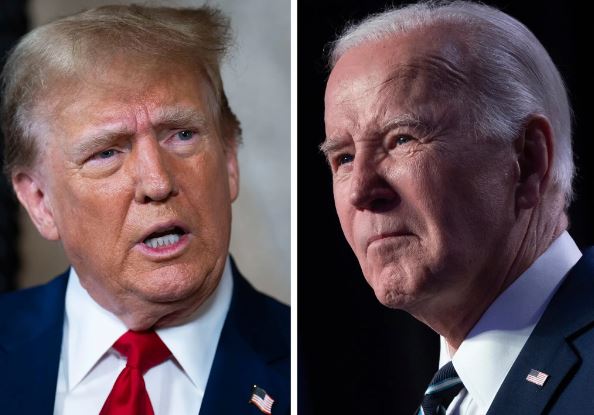President Biden and former President Donald J. Trump have officially clinched the nominations of their respective parties for the upcoming presidential election in November. The Associated Press reported on Tuesday that both candidates have secured the necessary delegates, paving the way for a highly anticipated rematch between the two political heavyweights.
The path to nomination for both candidates was relatively smooth, with Mr. Biden facing minimal opposition in the Democratic primary and Mr. Trump maintaining a dominant position within the Republican Party despite facing some challenges. Mr. Trump’s victory in Iowa earlier in the year effectively cleared the Republican field, solidifying his position as the party’s frontrunner.
The Associated Press designated Mr. Biden as the presumptive Democratic nominee following his projected victory in Georgia, while Mr. Trump secured the presumptive Republican nomination after sweeping the GOP contests in Georgia, Mississippi, and Washington State.
The confirmation of their nominations sets the stage for what is expected to be one of the longest general election campaigns in modern American history, with both candidates gearing up for a heated showdown in November. Mr. Biden has been emphasizing the threat posed by Mr. Trump in his campaign speeches, while Mr. Trump has been focused on rallying support to defeat his Democratic opponent.
Although formal nominations will be made at their respective party conventions later this summer, both candidates have already been actively mobilizing their political and financial resources. Mr. Biden has been utilizing the infrastructure of the Democratic National Committee, while Mr. Trump’s campaign has taken over the Republican National Committee, implementing significant organizational changes.
Mr. Trump’s swift nomination victory underscores his continued influence within the Republican Party, despite facing legal challenges and criticism. His ability to quickly secure the nomination was facilitated by efforts to navigate primary rules and delegate allocations in his favor. For example, his campaign played a role in shaping California’s delegate allocation rules, which ultimately benefited his candidacy.
Similarly, Mr. Biden’s path to the nomination was relatively straightforward, with overwhelming support in the Democratic primaries. His victory in virtually every contest solidified his position as the party’s standard-bearer.
However, both candidates face challenges within their respective coalitions that could impact their prospects in November. Mr. Trump’s performance with suburban voters and moderates remains a concern, while Mr. Biden’s handling of certain issues, such as the conflict in Gaza, has led to discontent among some segments of the Democratic base.
Additionally, both candidates are viewed unfavorably by a significant portion of the electorate, highlighting the polarized nature of American politics. Despite this, both campaigns remain confident that they can rally their supporters and secure victory in November.
As the general election campaign kicks into high gear, both candidates will continue to focus on mobilizing their bases and appealing to undecided voters. With significant financial resources and a lengthy campaign ahead, the Biden-Trump rematch promises to be a closely watched and hotly contested battle for the presidency.

